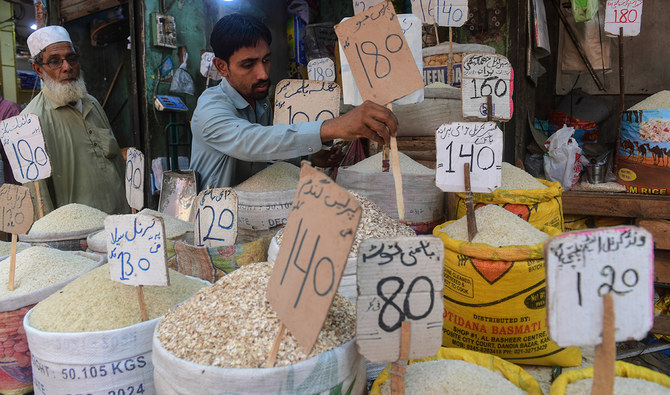KARACHI: Independent economic experts in Pakistan warned on Thursday the $3 billion International Monetary Fund (IMF) bailout program, approved by its executive board a day earlier, might offer short-term relief to the country but would further exacerbate its debt position and increase poverty levels.
Pakistani authorities reached a stand-by agreement (SBA) with the IMF last month to secure the financial package hours before the expiry of a $6.5 billion Extended Fund Facility signed in 2019. The development took place at a time when the South Asian nation was said to be on a brink of default on its international obligations amid a complex balance-of-payments crisis.
According to a statement posted on the IMF website, it will immediately disburse $1.2 billion under the approved $3 billion short-term financing facility to boost Pakistan’s foreign exchange reserves which will also help the country unlock funding from other bilateral and multilateral donors.
However, experts maintained the development would only provide brief economic respite to the country.
“While the first tranche of $1.2 billion and funds from friendly countries and donors will give a short respite to Pakistan, it will not benefit the economy or its people in the long term,” Dr. Ikram ul Haq, a senior Lahore-based economist, told Arab News.
“It will further compound the debt servicing issue, raise the cost of doing business, and increase the hardships for an overwhelming majority of Pakistanis,” he continued.
Haq noted the burden of indirect taxes, rise in energy prices, mounting inflation and exorbitant discount rates would further prove detrimental to the economy.
According to the IMF, the $3 billion program will monitor the implementation of the new budget to facilitate fiscal adjustments in Pakistan and ensure debt sustainability. It added the loan facility would also focus on a “return to market-determined exchange rate” and proper foreign exchange market functioning to absorb external shocks and foreign exchange shortages.
Additionally, it will ensure a tight monetary policy to bring about disinflation and further progress on structural reforms with a particular focus on energy sector viability, governance of state-owned enterprises, and climate resilience.
Experts said, however, such bailout programs without necessary structural reforms would only make the lives of ordinary Pakistanis more difficult.
Haq argued such financial arrangements would not yield long-term results the elite was “not ready to forgo benefits and privileges or opt for much-needed and long-overdue structural reforms in all areas of governance.”
Some experts also maintained the bailout would provide stability to the country and ease inflationary pressure.
“This better-than-expected loan by the IMF will provide the much-needed stability to Pakistan at a time when it is going to witness a transfer of power from one government to caretaker setups and then a new administration,” Muhammad Sohail, chief executive officer of Topline Securities, told Arab News.
“Besides, it will further help with bilateral and multilateral loans, thereby supporting the falling foreign exchange reserves and stabilizing the currency and inflationary pressure,” he added.
Prime Minister Shehbaz Sharif also welcomed the development on Wednesday, saying it would offer economic relief to the country and generate more fiscal room for the next government.
“The approval of Stand-by Agreement of $3 billion by the IMF’s Executive Board a little while ago is a major step forward in the government’s efforts to stabilize the economy and achieve macroeconomic stability,” the prime minister said in a Twitter post. “It bolsters Pakistan’s economic position to overcome immediate- to medium-term economic challenges, giving next government the fiscal space to chart the way forward.”
He maintained his administration had managed to secure the deal “against the heaviest of odds & against seemingly impossible deadline,” praising the country’s financial managers for their team work.
https://twitter.com/CMShehbaz/status/1679184073540108288?s=20
Pakistan has witnessed some positive developments since the initial agreement, including an inflow of $2 billion from Saudi Arabia and $1 billion from the United Arab Emirates (UAE). Apart from that, there has been an improvement in its credit rating by one notch to CCC by Fitch.
With the expected IMF disbursement of $1.2 billion, the country’s official reserves are expected to increase to over $8 billion, a level previously was seen in October 2022. Some countries, including China, have already rolled over their debt.
“The IMF, China, KSA and UAE all have played their role to save us once again,” Khurram Schehzad, CEO of Alpha Beta Core, a financial advisory firm, said. “Now we have no excuse of not putting our own house in order.”
Pakistan expects $25 billion in gross new external financing in current fiscal year (FY24), against $15 billion in public debt maturities, including $1 billion in bonds and $3.6 billion to multilateral creditors.
The government’s funding target includes $1.5 billion in market issuance and $4.5 billion in commercial bank borrowing, both of which could prove challenging, though some of the loans not rolled over in FY23 might return now, according to Fitch Ratings.
The IMF bailout program was renewed after several contacts between Prime Minister Sharif and IMF Managing Director Kristalina Georgieva with an understanding to modify the federal budget to address the international lender’s concerns.















